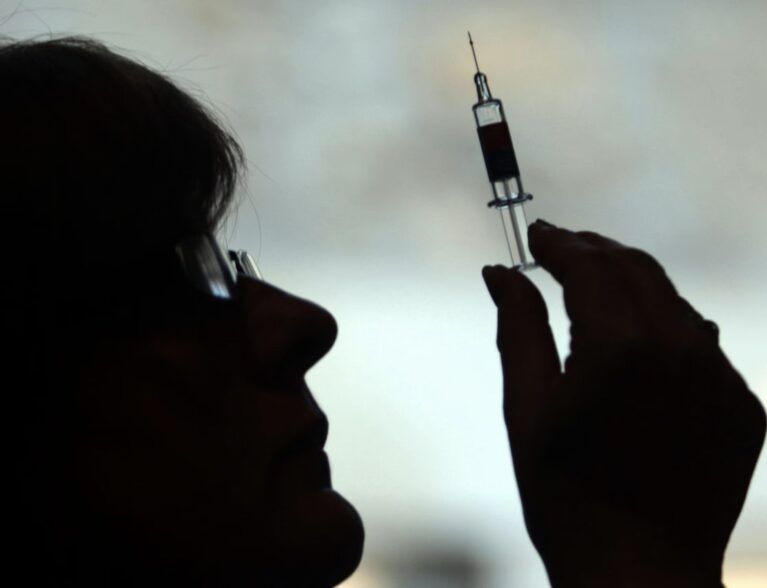
Four new vaccines designed to protect against Respiratory Syncytial Virus are on the Centers for Disease Control and Prevention’s agenda this week, with two vaccines expected to be available this fall to help older adults fend off the potentially dangerous virus.
Respiratory Syncytial Virus, or RSV – discovered in the late 1950s – is a highly contagious, lower-respiratory infection that nearly went dormant during COVID-19 lockdowns, but the threat from RSV is now on the rise again here.
Up north, RSV tends to be seasonal, ramping up in fall and peaking in the winter. But locally, RSV season runs 12 months of the year, and according to the Florida Department of Health’s weekly RSV report, the percentage of patients testing positive for RSV is increasing in Indian River and St. Lucie counties.
The likelihood that a safe and effective RSV vaccine will be available for the first time this fall is an exciting development, since there is no specific, widely recommended treatment for RSV once a patient is infected – only supportive care of the lungs with oxygen and bronchodilators. More than 14,000 Americans die from RSV each year.
“I think that all individuals above age 60 should strongly consider getting this RSV vaccine.
This is especially important for those with chronic health conditions,” said Vero Beach infectious disease expert Dr. Gerald Pierone of Whole Family Health. “I am looking forward to the roll out of these RSV vaccines because I think they will lessen the risk of hospitalization and death from this infection.”
Dr. Kenneth Alexander, Chief of Infectious Diseases at Nemours Children’s Hospital, Florida, sees RSV mostly from the pediatric medicine side, which has over the years developed some tools to prevent RSV while waiting for a vaccine.
“Respiratory syncytial virus (RSV) has long been recognized as the leading cause of pneumonia affecting babies in the first year of life. RSV pneumonia can be especially severe in babies that were born prematurely, and in babies with congenital heart or lung disease,” Alexander said. “Unfortunately, we lack specific treatments for respiratory syncytial virus.”
While doctors use expensive antibody drugs in at-risk pediatric patients in an effort to keep them out of the hospital, Alexander said that “right now, none of the active vaccines is approved for use in babies. Instead, they are approved for use in adults age 60 and over.”
Over the past two months, the FDA vaccine panel has moved four different RSV vaccine formulas through the approval process – two for older adults, one for infants and one for pregnant women. Now the CDC will weigh the need for these vaccines and their efficacy in clinical trials.
Local seniors with grandchildren, or friends and family who work in childcare or in the school system need to think about the risks of RSV.
“We have learned in recent years that RSV is not just a disease of babies. It turns out that RSV is a particularly bad actor in the elderly and is a common cause of both hospitalization and mortality,” Alexander said. “Children get RSV and then share it with their grandparents. Hopefully, we will begin to see people over 60 get RSV vaccination to prevent pneumonia in adults.”
Outbreaks of RSV must be reported to local health departments, but RSV can go undiagnosed because its initial symptoms – runny and/or stuffy nose, sore throat, cough, fever, chills headache and fatigue – resemble other common infections. Two out of three babies will contract RSV by the time they reach the one-year-old mark.
When a patient shows up to an urgent care or doctor’s office in the post-pandemic new normal era, if a rapid Covid test is negative, an Influenza rapid test may be performed, and possibly a test for Strep, but the testing typically stops there unless the doctor suspects RSV.
Most cases of RSV resolve in 10 to 12 days, but in a person at risk for complications, RSV can cause inflammation of the small airways of the lung (bronchiolitis) and pneumonia.
Until the new single-shot vaccines – GlaxoSmithKline’s Arexvy and Pfizer’s Abrysvo – are available, Dr. Pierone reminds patients about the common-sense things they can do to avoid getting any type of viral infection this summer.
“I think that because of COVID, there is much more attention being paid to avoiding contact with people who have an upper respiratory infection. In the past it was very common for people to go to work or school even though they were sick with a cold,” Pierone said. “So the right thing to do if someone is coming down with an infection is to avoid going to cocktail parties, dinner parties, and areas of common congregation to avoid transmitting different viral infections to others. There is also ample evidence that wearing a mask can lessen the risk of acquiring viral infections.”



